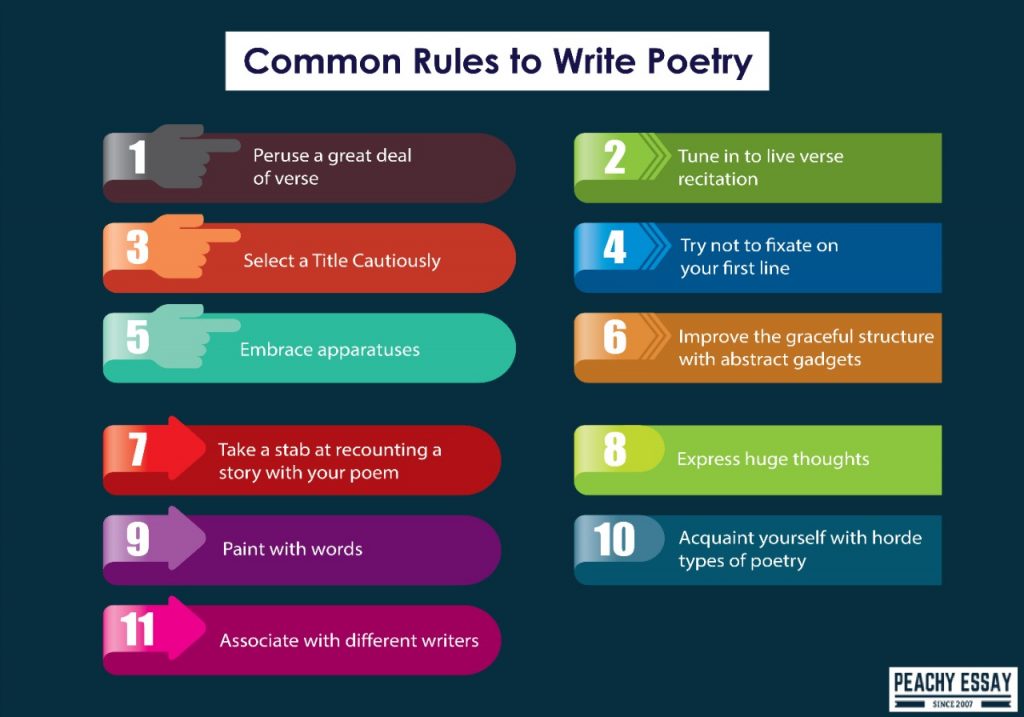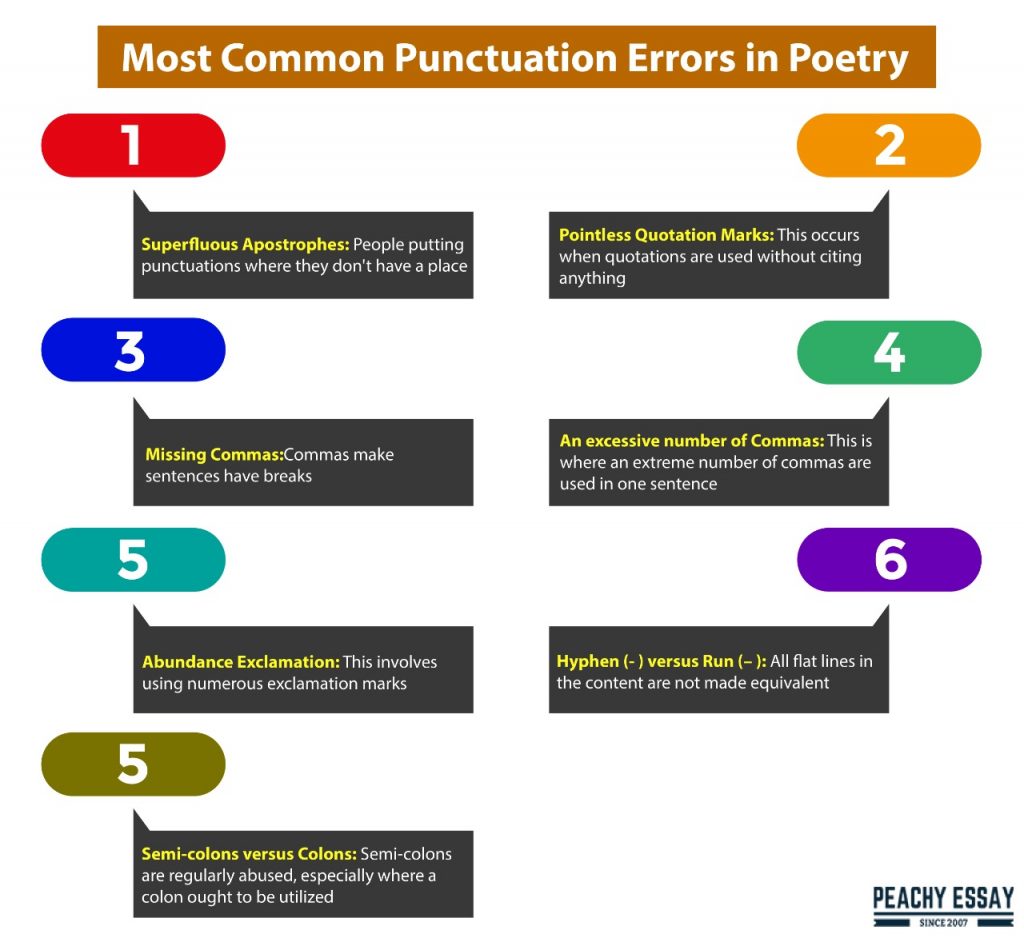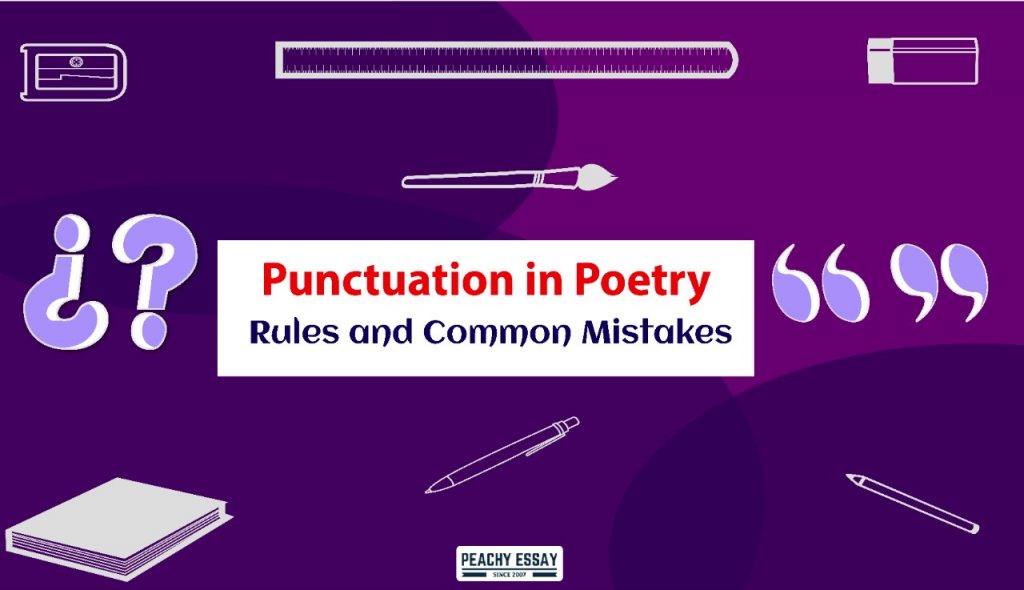Punctuation is a vital segment of written language. It signals to the reader how the sentence is to be perused, so the importance gets evident. For example, a period shows that the sentence is an assertion and, consequently, read with a nonpartisan tone or even in a falling inflection. However, a question mark shows an inquiry, flagging that it should be spoken with a rising pitch. Punctuation likewise tells the reader the feeling, for example, through the exclamation mark. Punctuation has numerous utilizations in language, both oral and composed, which is the reason it ought not to be underestimated, particularly in confounded composed structures like verse.
The job of punctuation frequently confounds individuals who are new to poetry. Some have blamed others for utilizing line breaks as punctuation and excuse the work right away. The thing is, poetry has been around for a long, long time, in any event, going before composing; thus, it regularly explores different avenues regarding language guidelines. A few writers hold fast to sentence structure principles, while others, similar to the scandalous approaches. Definitely, disrupting the guidelines is alluring; notwithstanding, it is invaluable for new writers to initially dominate the principles before contemplating messing with or breaking them.
Punctuation rules in poetry are applicable for upcoming writers, yet additionally for English majors and even readers. Knowing the principles of accentuation is vital for better understanding and investigation of poetry.
Punctuation in Poetry
Poetry is a structure that places equivalent accentuation on structure and significance. The structure isn’t only a vessel through which the reader observes the importance of a poem. Frequently, the importance likewise communicates with and influences the structure. To accomplish this, writers use accentuation marks to control significance and discernment—it influences the reader’s speed, comprehension, and eye development. Accentuation is critical to writers’ undertakings to investigate and extend the constraints of language in their works. Here are the uses of punctuation in poetry.
- Sorts out musings and thoughts
- Looks after intelligibility
- Signs stops, or when and where to relax
- The situation of accentuation checks additionally decides the sorts of sections:
End-halted line – when accentuation shows up toward the stopping point
First, having perused the book of legends,
- Enjambment – where there is no punctuation toward the stopping point; typically, the idea proceeds to the following line
I put on
the body-defensive layer
of dark elastic
the ludicrous flippers
the grave and off-kilter veil.
- Caesura – when a punctuation mark shows up inside the line
Furthermore, I am here, the mermaid whose dim hair.
Breaking the Rules
Artists take additional consideration when composing poems. Each line break, each accentuation, and word is picked with extraordinary consideration. All that they use in their poems is only innovative apparatuses or methods, even accentuation. Thus, at whatever point an artist breaks any show in language structure, it is consistent for a valid justification.
Hence, for anybody considering disrupting the norms in their poetry, it is basic to initially know the syntactic guidelines’ intricate details. It is in every case better to understand what you are breaking so you can utilize it as an inventive strategy—a purposeful decision—instead of as a mix-up.
What are the Rules of Poetry?
There are no authoritatively authorized guidelines of poetry. Be that as it may, likewise with all exploratory writing, having some level of design can help you reign in your thoughts and work profitably. Here are a few rules for those hoping to take their poetry, keeping in touch with the following level. Or then again, if you haven’t composed a solitary poem since secondary school, you can consider this a novice’s guides that will show you the nuts and bolts and make them compose verse quickly.
Here are the rules of poetry

- Peruse a great deal of verse: If you need to compose poetry, start by understanding poetry. You can do this in an easygoing manner by letting the expressions of your number one poems wash over you without essentially burrowing for more profound significance. Or then again, you can dive into the investigation.
- Tune in to live verse recitation: The experience of devouring verse doesn’t need to be a scholastic exercise in classifying graceful gadgets like similar-sounding word usage and metonymy. It tends to be melodic, for example, when you go to a poetry slam interestingly and hear the smart consonants of a poem so anyone can hear. Numerous book shops and cafés have poetry readings, and these can be both fun and informational for yearning writers. By tuning in to the hints of good verse, you find the excellence of its development—the blend of focused on syllables and unstressed syllables, similar sounding word usage and sound similarity, a very much positioned inward rhyme, astute line breaks, and that’s only the tip of the iceberg. You’ll never think about the artistic expression a similar way once you hear great poems read aloud.
- Start little: A short poem like a haiku or a basic rhyming sonnet may be more achievable than jumping into an account epic. A basic rhyming sonnet can be a non-scaring doorway to verse composing. Try not to confuse amount with quality; a perfect seven-line free stanza sonnet is more amazing than a messy, meandering aimlessly epic of clear refrain measured rhyming, although it presumably required some investment to make.
- Try not to fixate on your first line: If you don’t feel you have precisely the correct words to open your poem, don’t surrender there. Continue to compose and return to the principal line when you’re prepared. The initial line is only one segment of a general piece of artistry. Try not to give it more outsized significance than it needs.
- Embrace apparatuses: If a thesaurus or a rhyming word reference will help you complete a sonnet, use it. You’d be astounded by the number of expert authors who additionally utilize these apparatuses. Be certain you comprehend the real importance of the words you embed into your sonnet. A few equivalents recorded in a thesaurus will digress from the importance you wish to pass on.
- Improve the graceful structure with abstract gadgets: Like any composing, the poetry is upgraded by scholarly gadgets. Build up your verse composing abilities by embeddings representation, moral story, synecdoche, metonymy, symbolism, and other abstract gadgets into your poems. This can be generally simple in an unrhymed structure like free section and more testing in beautiful structures with severe principles about meter and rhyme conspire.
- Take a stab at recounting a story with your poem: A considerable lot of the thoughts you may communicate in a novel, a short story or an exposition can turn out in a poem. Similarly, as with all types of English language composing, correspondence is the situation in poetry, if you need to recount short stories in your poems, embrace that nature.
- Express huge thoughts: Since the great verse is about language accuracy, you can communicate an entire way of thinking in not many words if you pick them cautiously. Indeed, even apparently light, graceful structures like nursery rhymes or a senseless rhyming limerick can convey huge, strong thoughts. You need to pick the correct words.
- Paint with words: When a writer paints with words, they use word decisions to metaphorically “paint” solid pictures in a reader’s brain. In the field of visual craftsmanship, painting pictures obviously alludes to the demonstration of addressing individuals, items, and landscapes for watchers to view with their own eyes. In experimental writing, painting pictures likewise alludes to delivering a clear image of individuals, articles, and scenes; however, the craftsman’s medium is the composed word.
- Acquaint yourself with horde types of poetry: Each extraordinary type of verse has its own prerequisites—rhyme plot, number of lines, meter, topic, and that’s just the beginning—that make them novel from different kinds of sonnets. Consider these constructions what might be compared to the punctuation decide that administer exposition composing. Regardless of whether you’re composing a villanelle or free section verse (which has no principles in regards to length, meter, or rhyme plot), it’s critical to flourish inside the limits of the sort of verse you’ve picked. Regardless of whether you at last form all your work as one specific kind of sonnet, flexibility is as yet a significant ability.
- Associate with different writers: Artists associated with each other through verse readings and maybe verse composing classes. Writers in a creative local area frequently read each other’s work, discuss their own poems resoundingly, and give input on first drafts. A great verse can take numerous structures. Through a local area, you may experience various structures that fluctuate from the sort of sonnet you commonly compose—yet are comparably creatively moving. Search out a verse bunch where you can hear various kinds of verse, examine the fine art, write down groundbreaking thoughts, and gain from what is crafted by your companions. A strong local area can help you conceptualize thoughts, impact your perspective as a craftsman, and offer verse practices that may have helped different individuals from the group produce extraordinary verse.
Does Poetry Need Punctuation?
A few groups accept poetry shouldn’t be accentuated, and others are as yet educated to put a comma after each new line. So, where is the equilibrium? What does one – particularly one new or filling in verse – do? Indeed, that is straightforward: an artist should accentuate with a reason!
To intersperse with reason, nonetheless, a writer should comprehend two things: what she needs to accomplish with the poem and what a piece of accentuation can accomplish in a poem. This implies a writer should see more than the basic standards of accentuation; she should know the impact that specific accentuation points can have on a reader or content.
What are the Most Common Punctuation Errors?
Using the right accentuation will not assist you to make companions or lift your business, yet utilizing accentuation erroneously will make your book, magazine or list duplicate stick out in contrast to everything else. Regardless of whether individuals can’t pinpoint your slip-up, something will look off about your message, making individuals more averse to believe what you’re attempting to say.
It’s in every case best to check your composition for regular accentuation botches so you don’t incidentally distance the individuals who will peruse your material.
Here are 10 of the most well-known accentuation blunders individuals make and how you can try not to make them.

- Superfluous Apostrophes
The Problem: People putting punctuations where they don’t have a place.
Example to maintain a strategic distance from It is all her’s. Ten pounds’ off!
How to evade: Such cases need the word to be written in the plural, so add an “s.” Add punctuation on the off chance that you need the possessive structure, for example, “That is my better half’s vehicle.”
Punctuations are likewise utilized for constrictions, for example, “shouldn’t” for “should not.”
- Pointless Quotation Marks
This occurs when quotations are used without citing anything.
Guide to keep away from: They provide the ‘cheapest services in town!
If you aren’t citing anything, don’t use single or double quotation marks. In case you want to emphasize a particular word/phrase, bold or italicize it.
- Missing Commas
Commas make sentences have breaks. Example to evade: He visited the hospital however it was shut so he returned home.
Solution: Speak the above sentence loudly so anyone might hear and observe breaks in your discourse. Put commas where you stop or when you switch gears within the sentences.
- An Excessive Number of Commas
This is where an extreme number of commas are used in one sentence.
Example: He visited the hospital, however, it was shut, so he entered into his car, sat down, pulled out, and afterwards returned home.
- Abundance Exclamation
This involves using numerous exclamation marks.
Example: His item is awesome! He is truly smart! Buy one now!
- Hyphen (- ) versus Run (– )
The Problem: All flat lines in the content are not made equivalent.
Real model utilizing a hyphen: Our items are worked with high-grade steel.
Genuine model utilizing a dash: I lean toward chocolate milk – it’s more delectable than plain milk. However, I truly like strawberry milk – albeit the pink shading annoys me – on the grounds that the taste appears to be more extravagant.
How to Avoid: Use a hyphen (a little line) to consolidate two words to make a solitary thought. It’s most regularly used to join two words into a modifier. Utilize a dash to demonstrate that you’re moving onto a different thought or line of reasoning.
- Semi-colons versus Colons
The Problem: Semi-colons are regularly abused, especially where a colon ought to be utilized.
What to avoid: I brought three things; a toothbrush, a cover, and a cushion.
Real model: I am happy to be taking some time off; I need the rest from work.
How to Avoid: Use a colon in the event that you need to set o a rundown of things. If you need to isolate two related yet particular contemplations, utilize a semi-colon. Or on the other hand, on account of semi-colons, think about a period rather than break the idea into two separate sentences.
Read more: Punctuation Marks and How to Use Them


